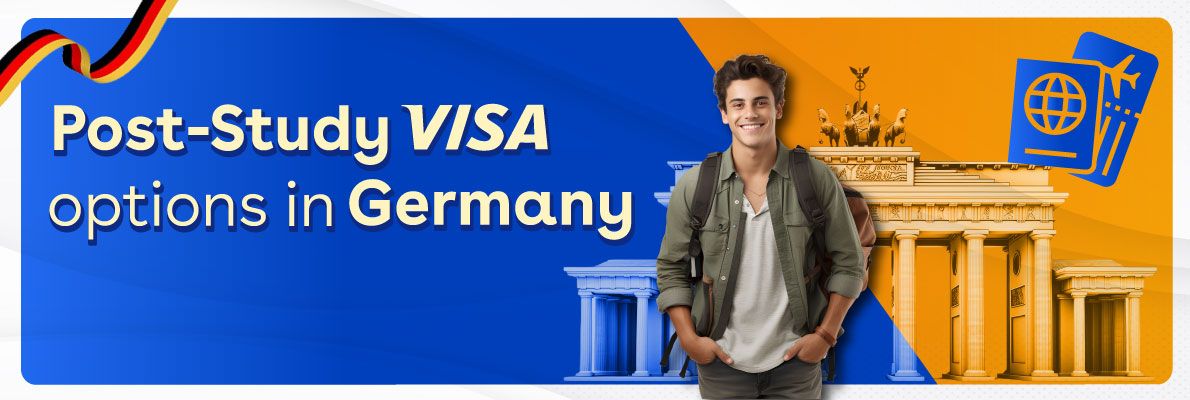After completing their higher studies abroad, the next step international students take is to seek great job opportunities. And one such country where learning and earning are considered to be among the best in the world is Germany. With advanced technology, precise engineering, and a strong financial sector – the country boasts ample job opportunities in related to major study areas.
So, after you complete your higher study in Germany, what are some of the options for job prospects you may ask? Well, that is where this article comes into play by covering different stay-back pathways. But before we start, let us answer – why working in Germany is so desirable.
Why Work in Germany?
From good salaries to a great working culture, the following are the benefits of post-study work in Germany,
- Good Pay Scale
- Strong Economy
- Stable Jobs
- Global Networking
- Career Growth
- Quality of life
Well, we have just listed a few benefits. As an important business hub many such benefits make this country – one of the happiest in the world. So let us now check the types of residence permits in Germany in case you aim to stay back after studying.
Types of Residence Permit Options in Germany
Given below is the breakdown of the Residence pathways available for international students:
- Jobseeker Permit: This type of Germany Student Visa is available for students who have completed their degree and are searching for employment. The Jobseeker Permit allows students to stay in the country for up to 18 months. Once you earn a valid employment contract, you can apply for a work permit and stay in Germany for a long period of time.
- Work Permit: If an international student is graduating with a job offer in hand in related field of study, he/she can apply for a work permit. The provided contract length for this residence permit is at least one year and can be extended as per level and field of study.
- Residence Permit for Qualified Skilled Workers: With a stable economy and a low unemployment rate, Germany attracts professionals to cover job shortages in particular industries. For professionals with relevant qualifications in related fields of study, Germany generously provides a residence permit. Initially, you need to work under a Job-Seeker Visa or an Employment Visa and then fulfil the requirements listed under – Recognition of Professional Qualifications.
- EU Blue Card: You can apply for an EU Blue Card if your degree is equivalent to the one you get from one of the top universities in Germany. The degree should also be at least level 6 on the International Standard Classification of Education or the European Qualifications Framework. With a handy job offer from a German company, you qualify for this card. Just ensure the job offer meets the income criteria specified for fields like Mathematics, IT, Natural Sciences, Engineering, and Human Medicine.
- Freelancer Visa: To work as a freelancer, or they say in German ‘freibe berufe’, you must be self-employed in fields like Healthcare, Law, Tax and Business Counselling, Scientific or Technical Field, and Linguistic and Information. To obtain this visa applicant must showcase proof of funds, relevant industry experience, and a solid business proposal. Also, the freelance activities should be registered with the local tax office called ‘Finanzamt’.
- Permanent Residency: Graduates who have completed two years of employment in Germany can apply for permanent residency. For this, you need to contribute to the pension funds and appear for the B1-level German Proficiency Test and show proof of adequate living space in Germany.
As we have seen the types of Residence Permits options you can apply to stay in Germany, let us look at some of the common documents that are required for almost all the above options.
Common Documents For Residence Permit in Germany
Given Below is the list of all common documents that may be required for all types of Residence Permit Options:
- Passport or other Valid Travel Documents
- Proof of Degree Completion or Previous Academic Qualifications
- Employment Contract or Job Offer Letter (if applicable)
- Proof of Financial Means or Funds to support oneself during the stay
- Health Insurance Coverage
- Police Clearance Certificate or Criminal Record Check
- Completed Application Forms for the specific Residence Permit Type
- Passport-sized Photographs
- Proof of Accommodation in Germany
In Conclusion, for any additional documents as specified by the German authorities for a specific residence permit option, check the website of the German consulate or embassy. Also, it is important to check regularly with the officials as the requirements and eligibility are subject to change as per the country’s interests and economic demands.
To make the complex process of documentation and application for a visa easier for you, consider taking visa-related guidance from European experts at Mentor Universe – Germany student visa consultant. Whether you plan to pursue your bachelors or masters in Germany, the team here is always ready to assist you out with the entire process from application, admission to the visa process, and even with post-visa services.





